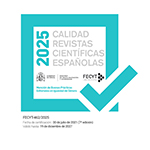"La Vida de San Ildefonso" del ex beneficiado de Úbeda en su contexto histórico
Abstract
"Vida by San Ildefonso" is studied in its historical context. In the work there appear several political and economic reasons to have written it: to praise Toledo and its archbishops (with the added motive of the question of the primacy of their cathedral and their arch-diocese), the argument for the life in a pious community, a cloistered life, and the praise of the «calongía» of Santa Leocadia, outside Toledo. The book is situated inside the full «molinista» movement and reflects the ideals of this school of thought: it is a correction of the Alfonsí model of knowledge (that scientific knowledge has to be subordinated to theology and pious life) and to the praise of chastity. It is a didactic-moral book in which a model of religious life is presented, the hagiography of a saint. There is an intertextuality with Libro del Buen Amor (not studied until now),which is written in the same historical context some years after (Vida around 1302 and Libro around 1322). Arcipreste’s book does not continue with this clear didactic-moral style but it is a complex, «goliárdica» parody, full of jokes. The comparison with this book by the «ex Beneficiado» and with other «molinistas» works make it possible to appreciate this difference.Downloads
Article download
License
In order to support the global exchange of knowledge, the journal Dicenda. Cuadernos de Filología Hispánica is allowing unrestricted access to its content as from its publication in this electronic edition, and as such it is an open-access journal. The originals published in this journal are the property of the Complutense University of Madrid and any reproduction thereof in full or in part must cite the source. All content is distributed under a Creative Commons Attribution 4.0 use and distribution licence (CC BY 4.0). This circumstance must be expressly stated in these terms where necessary. You can view the summary and the complete legal text of the licence.









